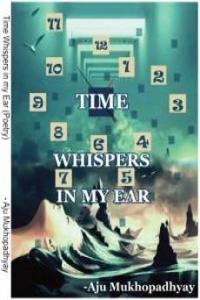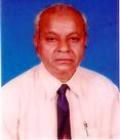Creation and Criticism
ISSN: 2455-9687
(A Quarterly International Peer-reviewed Refereed e-Journal
Devoted to English Language and Literature)
Vol. 01, Issue 02 : July 2016

Time Whispers in My Ear by Aju Mukhopadhyay
Aju Mukhopadhyay. Time Whispers in My Ear. Lucknow: www.onlinegatha.com, 2015. Price: Rs. 102. ISBN: 978-9385818-01-1.
Reviewed by T. V. Reddy
Time Whispers in My Ear is a book of Aju Mukhopadhyay’s selected poems. The poet himself states “All the selected poems published here have been published in different books of poems except ten fresh poems which have not been published in any other book.” But we are kept in total darkness regarding the already published verses and the new ones. The poem ‘The Burning Lamp’ is invested with spiritual and mystic atmosphere. He describes that the lamp was burning golden-brown steadily in his dark room and flowers of a mystic hue bloomed radiating his obscure chamber; at this stage the writer gives a twist and a mystic ending:
When you came to light the lamp
No one knew
No tread, no flash, no sound. (Time Whispers 10)
The second poem is the title piece ‘Time Whispers in My Ear’ presents a series of snap shots from nature relating to grass, forest rivers, hilly streams, volcanic eruption, flowing of molten lava, forest fires, desert storms, rains in forests, overflowing water bodies, growing seeds and dying trees and now the poet says ‘nature is at work without rest in every nook and corner, / in every pore and cell, near and far’; and time whispers in his ear that ‘consciousness keeps its progress in everything/constantly rolling towards the future.’ The poet repeats his flow of thoughts and says ‘time whispers in my ear/ that past never sits in its forlorn chair/but leaves its essence for assimilation’; and ‘the ethos of the bygone ages/can never be recovered by any strategist.’ He further continues:
The world may be seen in the grain of sand
but the flow of sand is constant;
infinity may be guessed in the palm of hand
but it cannot be gripped by any standard;
time whispers in my ear
that everything passes on for ever. (Time Whispers 12)
The next poem ‘A Woman Saviour of Mankind’ is a beautiful poem on a 22-year old courageous young woman Park Ji, a café worker in a ship who sacrificed her life in saving many of the passengers in the ship from getting drowned on 16th April 2014 while the captain of the ship fled betraying the hopes of all the helpless passengers. She saved many and in this act of selfless sacrifice she was drowned and buried in chill watery ground:
Inspired by the Divine will and bliss
She lives in man’s heart for her selfless sacrifice. (Time Whispers 13)
The next verse is ‘Nelson Mandela: An Epitome of Struggle and Victory’ and it is a plain description that celebrates the greatness of the South African leader who fought against the White rule and the much abhorred apartheid policy; at last he succeeded in ending the apartheid policy and got democratically elected as the first President of the country and won the Nobel Peace Prize. The poems ‘A Presence’ and ‘The Being’ are considerably spiritual in their content. The former speaks of the divine presence ‘in every heart/including that of the demon and the desert/ in humans and animals in a state rudiment/ in the bosom of the hazy and dark inconscient’, while the latter is the description of ‘The Being’ i.e. the Supreme Being whom he describes as ‘without a shape, formless/ without fragrance, odourless/ without a colour, not even whiteness/ beyond all sound/ pure and profound/ light or darkness’ and this thought is the result of his study of the ancient Hindu spiritual works such as the Upanishads; now he expresses his individual preference as well as his cherished thought:
Most I adore
is that absolute, the essence of all
beyond any question of rise or fall. (Time Whispers 18)
The poet, who is an ardent follower of the spiritual path of Sri Aurobindo gives expression to his absolute faith in and total devotion to that Supreme Being whom he adores till the end of his life:
Vast and limitless without a shore
with all sense It I adore
up to the last drop of my blood… (Time Whispers 18)
Most of the poems in this collection are devoted to spiritual ideas and thoughts related to the same theme. Poems such as ‘Inwardness’, ‘Invisible yet Perceptible’, ‘Invisibly with me’, ‘Do I Walk or I Walk Me’ are sprinkled with ideas relating to the Supreme Being. In ‘Inwardness’ he speaks of the feeling of loneliness of man with the fear of the unknown though he is very much present in the company and ‘When all cherished guests of life would drop off’ ‘a voiceless, guiltless hush settles’ ‘in serene impeccable atmosphere’. In the poem ‘Invisible yet Perceptible’ he says ‘life is meant for correction at each step’ and definitely reward comes to one ‘who believes and relies on grace/ of the invisible yet perceptible existence’ (Time Whispers 23). In the poem ‘Do I Walk or I Walk Me’ he expresses his total belief in the Supreme God with whose grace only we are able to move:
Is walking an act of mine
Or of the self indwelling? (Time Whispers 25)
Sri Aurobindo frequently uses the expression ‘the Indwelling Self’ both in his poetry and prose and Aju Mukhopadhyay being an ardent devotee of the great Yogi is very much influenced by the great spiritual master in the use of spiritual terminology. Another such expression is ‘body’ being referred to as the Being’s ‘tabernacle’. The poem ‘Pray that you Play your Part best’ where he refers to the world as a stage where everybody has to play the assigned parts is partly influenced by Shakespeare’s famous lines from his great comedy As You Like It describing the world as a stage where everyman is supposed to play seven parts. While the piece ‘A Complete Human Being’ is on Sri Aurobindo, the poems ‘February Twenty-first’ and ‘Mother the Divine Spark’ are on the Mother celebrating her birthday and the spark of her divinity.
The poet now switches over to the pages of South Indian history in the poem ‘Silent Witnesses of the Bygone Ages’ where he gives an account of the heart-rending ruins of Hampi of the once glorious Vijayanagara Empire on the banks of the river Tungabhadra which flourished for more than two and a half centuries in all power and pomp, glory and splendor from 1336 to 1565 C.E. It had reached the peak of its glory during the reign of Sri Krishnadeva Raya the unchallenged emperor of South India with three seas as natural boundaries of his kingdom, who was the patron of literature and music, sculpture and martial arts and in whose period pearls and precious stones were kept in heaps in the streets of the capital city of Vijayanagar and sold to Indian and Western customers. The poet quotes historian Swell: ‘Never perhaps in the history of the world has such havoc been wrought/and wrought so suddenly on so splendid a city/in the full plenitude of prosperity…’ (Time Whispers 53).
Aju Mukhopadhyay reveals his awareness of the present reality of the city of Kolkata where he was born and though he now lives in Pondicherry he makes frequent visits to the metro city; as such with first-hand knowledge he describes the present state of Kolkata:
Passing by the hillock of garbage
he lifts the handkerchief mechanically
to his nose - …….
Broken roads overcrowded bus footpaths encroached
Hoodlums and youngsters raising donations. (Time Whispers 57)
He is pained to see the rising violence and inhuman exploitation in this computerized world with technological hype and commercial fair where the players exploit the market share and this painful reality is presented in the poem ‘Structural Violence’:
Does the whole structure not require
overhauling or demolition with fire
to rebuild a new structure for all? (Time Whispers 60)
The same tone continues in the poem ‘Terrorism’ where he condemns the wide-spread terrorism which has now become the biggest menace to the entire world. In the poem ‘Uncivilized’ Aju Mukhopadhyay vehemently condemns the pollution caused by the so-called civilized countries and boldly says that ‘civilized people are the most uncivilized’ (p.61). This theme of exploitation continues in the lengthy 5-page poem ‘The Adivasi’ which bewails the total injustice done to the original inhabitants of Africa, America and Australia:
In an age of tense globalization
All are concerned about prosperity …
Old world of exploitation marches on. (Time Whispers 64)
The piece ‘What a Great Republican Shore are we Basking in!’ gives us statistical data regarding the staggering amount spent on agriculture and agro-subsidy and equally staggering number of debt-burdened farmer-suicides. Our leaders do not have any real intention to develop the country; on the other hand their only aim is to protect their political power by throwing trifles like free-rice, free T.V., free cycle and such other doles as freebies to the selfish, short-sighted and narrow-minded voters. While the poems ‘India the Mother’ and ‘Our National Anthem’ are written with patriotic fervor, the poem ‘The Events’ is about the common event such as literary festivals conducted in all parts of the world which are mostly faceless and colourless; such events after events take place without making any real contribution either to literature or to the reading community or to the society; but the reality is ‘a gulf of silence/ island of non-existence/ nothing prevails’:
Everything flows into the void
yet they take place
the evanescent events. (Time Whispers 92)
Aju’s love for birds, tiny creatures and insects is vividly presented in poems such as ‘The Profile of Birds’, “Insect’s Nest’, ‘Ant’s Hut’ and ‘Bumblebee Bamboozles’. He tries to give some philosophical message by saying that like insect’s nest all great constructions would vanish in course of time; in other words he underlines the ephemerality of worldly things and man-made constructions:
Ain’t all the great constructions
like insect’s nest brittle and fragile
sure to go
today or tomorrow
measured by time?’ (Time Whispers 103).
In one of the end poems ‘Fluttering before Settling at the Right Place’ he comes back to his favourite theme of spirituality stressing the need to find the truth of our being:
To find the truth of our being
Let us dip our antennae
Into the nectar of the flower
With the OM falling like a shower.. (Time Whispers 113)
He strikes a note of optimism in the penultimate poem ‘Flower of the Future’ where he expresses that the mystic bud shall bloom unseen and unknown with shimmering hope rising up:
That the flower of the future
In harmony with Nature
For a Divine purpose
Has been opening its petals
From ages far behind
Towards a time
Peaceful and glorious. (Time Whispers 115)
Aju Mukhopadhyay is an eminent poet of the modern times and he has rightly taken the decision to bring out this collection even though most of the poems have already been published in his previous volumes. He has added new vigour, beauty and novelty to this present book by including ten fresh poems which have gone a long way in enhancing the quality of this collection.
The book in fact runs on the two parallel lines of love and life and draws its sustenance from the theme of love and life which can never be divorced from each other. The beauty of the book lies in the poetic rhythm created by the whispers of other harmony springing from the perennial springs of love and life. Towards the close the manifestation of the metaphysical beauty of the veritable truth of whispers of Time becomes a virtual reality as Time whispers not only in the poet’s ear, but in the ears of the entire reading community.
The Reviewer:
 Prof. (Dr) T. Vasudeva Reddy, Professor Emeritus, is an award winning poet, novelist and critic. Born in December 1943 in a village near Tirupati, he did masters in English in 1966; got his Ph. D for his thesis on the novels of Jane Austen. He worked as lecturer, reader and UGC National Fellow and visiting professor, and retired as principal of a government degree college in December 2001. He received the Awards of International Eminent Poet in 1987, Hon. D. Litt. from the WAAC, San Francisco in 1988, Best Teacher Award at the College & University level from the Govt. of AP in 1990, Best Poetry award for his third poetry book The Fleeting Bubbles from Michael Madhusudan Dutt Academy, Calcutta in 1994 and the prestigious U.G.C Award of National Fellowship in 1998. His biography figures in the American Biographical Institute (N. Carolina, USA), International Biographical Institute (Cambridge), Reference India and Asia (New Delhi), and Sahitya Akademi (New Delhi). He has received the international Award of “Excellence in World Poetry” in 2009. He can be contacted at vasudevareddyt@yahoo.com.
Prof. (Dr) T. Vasudeva Reddy, Professor Emeritus, is an award winning poet, novelist and critic. Born in December 1943 in a village near Tirupati, he did masters in English in 1966; got his Ph. D for his thesis on the novels of Jane Austen. He worked as lecturer, reader and UGC National Fellow and visiting professor, and retired as principal of a government degree college in December 2001. He received the Awards of International Eminent Poet in 1987, Hon. D. Litt. from the WAAC, San Francisco in 1988, Best Teacher Award at the College & University level from the Govt. of AP in 1990, Best Poetry award for his third poetry book The Fleeting Bubbles from Michael Madhusudan Dutt Academy, Calcutta in 1994 and the prestigious U.G.C Award of National Fellowship in 1998. His biography figures in the American Biographical Institute (N. Carolina, USA), International Biographical Institute (Cambridge), Reference India and Asia (New Delhi), and Sahitya Akademi (New Delhi). He has received the international Award of “Excellence in World Poetry” in 2009. He can be contacted at vasudevareddyt@yahoo.com.


